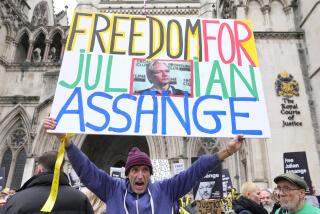3 British Bankers May Face U.S. Trial
- Share via
LONDON — Three British bankers wanted on Enron-related fraud charges are to be extradited to the United States after the failure Tuesday of a last-ditch appeal to the European Court of Human Rights to halt their deportation.
The court was the last avenue of appeal for the three former executives at Greenwich NatWest, a unit of Royal Bank of Scotland Group, who have become a cause celebre in Britain because of the controversial legislation used to pursue their extradition.
After a lengthy fight through each level of the British courts before the appeal to the European court, David Bermingham, Gary Mulgrew and Giles Darby -- known as the Bermingham Three -- will leave Britain for Enron Corp.’s home state of Texas before July 17 to face seven counts of wire fraud each.
They had appealed to the European Court of Human Rights to freeze a February ruling from the British High Court ahead of a fuller appeal.
They have consistently argued that because most of the alleged offenses took place in Britain that any trial should be held here. They also argued that being forced to stand trial in Texas would be unjust and incompatible with European human rights law.
However, the European court said in a letter to London law firm Jeffrey Green Russell on Tuesday that it saw no immediate cause to overturn the decision of the British courts.
The three were indicted by U.S. authorities under a treaty Britain signed with the United States in 2003 purportedly aimed at speeding up the process of bringing suspected terrorists to justice.
Instead, the agreement has opened the door for the U.S. to pursue senior executives whose alleged offenses either took place mostly in Britain or were not even crimes here.
Legal experts have cried foul on the 2003 treaty because it is not reciprocal. The U.S. has signed it, but the Senate has not yet ratified it while groups such as the American Civil Liberties Union lobby against it.
That means British officials still must meet a higher burden of evidence when seeking extradition.
The three were charged in the United States in 2002 with bilking Greenwich NatWest of $7.3 million.
They allegedly advised NatWest in 2000 to sell part of an Enron business it owned for less than the stake was worth, in a scheme allegedly devised with Andrew S. Fastow, former finance chief of Enron, and his colleague managing director Michael Kopper.
The three men then left NatWest, bought into the firm themselves and sold it for a much higher fee, each pocketing about $2.6 million in the process, prosecutors say.
More to Read
Sign up for Essential California
The most important California stories and recommendations in your inbox every morning.
You may occasionally receive promotional content from the Los Angeles Times.













